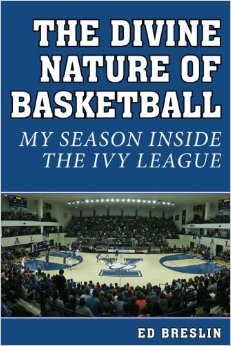
Let me be clear before the outset of this review: I did not attend an Ivy League school, nor did I previously have an appreciation for it. Save for a few friends who worshiped Penn hoops, my loyalties remain in the old Big East and the current ACC. So it is with that lens that I review Ed Breslin’s The Divine Nature of Basketball: My Season Inside the Ivy League, his look at the 2011-12 Yale Bulldogs basketball team, led by head coach James Jones. Breslin petitioned Jones to be a special assistant coach, essentially shadowing the team throughout the entire season. What follows is an insiders look at one of the more entertaining Yale basketball seasons in recent memory.
It’s clear within a few pages of reading that Breslin eats, prays and loves college basketball. Breslin devours media guides and watches intently through practices. Throughout the course of the season, Yale basketball completely consumes his life and his passion oozes through the pages of the book. His enthusiasm is contagious, and it’s hard not to become a Yale fan, too.
Breslin does an excellent job giving the full dynamics of the team and we begin to appreciate each of the players. There’s Greg Mangano, the star and low post stud, who can float out to the perimeter. There’s Austin Morgan, a sniper from downtown, who is frequently Mangano’s inside-out partner. And there’s Reggie Willhite, a fearless defender, who is the glue guy that any team needs to be successful. The rest of the roster is rounded out by a Fab Five freshmen core of future stars, and an eclectic mix of veterans, some of whom have had to accept lesser roles on the team. Halfway through the book, and you can’t help but root for the team, and, again, this is coming from someone with a previously neutral rooting interest.
On a broader level, Breslin makes it easy to appreciate the Ivy League, one of the last remaining bastions of a throw-back era of college basketball. The Ivy League still has seniors who have waited their turn as opposed to the new one-and-done era of high-major programs like Syracuse, Kentucky and UCLA. The league also lacks a post-season tournament, which places each regular season game between the rock of a critical game and the hard place of a must-win game. Breslin treats each game as such, and we ride the highs and lows of the season with him.
But Breslin makes a few tactical errors in the book. A casual reader, completely unfamiliar with the game of college basketball, isn’t likely to pick up the book and make it all the way to the end. This book is written for a selective audience of basketball die-hards, and, perhaps, even the more micro audience of Ivy League basketball die-hards. I mention this because Breslin curiously spends time talking about the fundamentals of basketball, which any CYO 7th grader could rattle off. I’m not sure it was necessary for Breslin to spend time writing about principles of man-to-man defense versus zone, or motion offenses. Any serious reader of this book would likely skip right past it.
But once you’ve moved beyond the initial introductory chapters, the book is an entertaining page-turner and written with the exuberance of someone eager to share his passion. If you love college basketball, Breslin’s book is certainly worth a look.
Story originally published on Ivy Hoops Online: http://ivyhoopsonline.com/2014/02/05/book-review-the-divine-nature-of-basketball-by-ed-breslin/